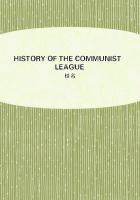This course of things, expressed historically, is the history of the development of the bourgeoisie. If "political conditions are the decisive cause of the economic situation" {D. K. G. 230-31}, then the modern bourgeoisie cannot have developed in struggle with feudalism, but must be the latter's voluntarily begotten pet child. Everyone knows that what took place was the opposite. Originally an oppressed estate liable to pay dues to the ruling feudal nobility, recruited from all manner of serfs and villains, the burghers conquered one position after another in their continuous struggle with the nobility, and finally, in the most highly developed countries, took power in its stead; in France, by directly overthrowing the nobility; in England, by ****** it more and more bourgeois and incorporating it as their own ornamental head. And how did they accomplish this? Simply through a change in the "economic situation", which sooner or later, voluntarily or as the outcome of combat, was followed by a change in the political conditions. The struggle of the bourgeoisie against the feudal nobility is the struggle of town against country, industry against landed property, money economy against natural economy; and the decisive weapon of the bourgeoisie in this struggle was its means of economic power, constantly increasing through the development of industry, first handicraft, and then, at a later stage, progressing to manufacture, and through the expansion of commerce.
During the whole of this struggle political force was on the side of the nobility, except for a period when the Crown played the bourgeoisie against the nobility, in order to keep one estate in check by means of the other [71] ; but from the moment when the bourgeoisie, still politically powerless, began to grow dangerous owing to its increasing economic power, the Crown resumed its alliance with the nobility, and by so doing called forth the bourgeois revolution, first in England and then in France. The "political conditions" in France had remained unaltered, while the "economic situation" had outgrown them. Judged by his political status the nobleman was everything, the burgher nothing; but judged by his social position the burgher now formed the most important class in the state, while the nobleman had been shorn of all his social functions and was now only drawing payment, in the revenues that came to him, for these functions which had disappeared. Nor was that all. Bourgeois production in its entirety was still hemmed in by the feudal political forms of the Middle Ages, which this production -- not only manufacture, but even handicraft industry -- had long outgrown; it had remained hemmed in by all the thousandfold guild privileges and local and provincial customs barriers which had become mere irritants and fetters on production. The bourgeois revolution put an end to this. Not, however, by adjusting the economic situation to suit the political conditions, in accordance with Herr Dühring's precept -- this was precisely what the nobles and the Crown had been vainly trying to do for years -- but by doing the opposite, by casting aside the old mouldering political rubbish and creating political conditions in which the new "economic situation" could exist and develop. And in this political and legal atmosphere which was suited to its needs it developed brilliantly, so brilliantly that the bourgeoisie has already come close to occupying the position held by the nobility in 1789: it is becoming more and more not only socially superfluous, but a social hindrance; it is more and more becoming separated from productive activity, and, like the nobility in the past, becoming more and more a class merely drawing revenues; and it has accomplished this revolution in its own position and the creation of a new class, the proletariat, without any hocus-pocus of force whatever, in a purely economic way. Even more: it did not in any way will this result of its own actions land activities -- on the contrary, this result established itself with irresistible force, against the will and contrary to the intentions of the bourgeoisie; its own productive forces have grown beyond its control, and, as if necessitated by a law of nature, are driving the whole of bourgeois society towards ruin, or revolution. And if the bourgeois now make their appeal to force in order to save the collapsing "economic situation" from the final crash, this only shows that they are labouring under the same delusion as Herr Dühring: the delusion that "political conditions are the decisive cause of the economic situation"; this only shows that they imagine, just as Herr Dühring does, that by ****** use of "the primary", "the direct political force", they can remodel those "facts of the second order" {D. Ph. 538}, the economic situation and its inevitable development; and that therefore the economic consequences of the steam-engine and the modern machinery driven by it, of world trade and the banking and credit developments of the present day, can be blown out of existence by them with Krupp guns and Mauser rifles. [72]
III.
THEORY OF FORCE














